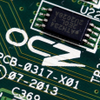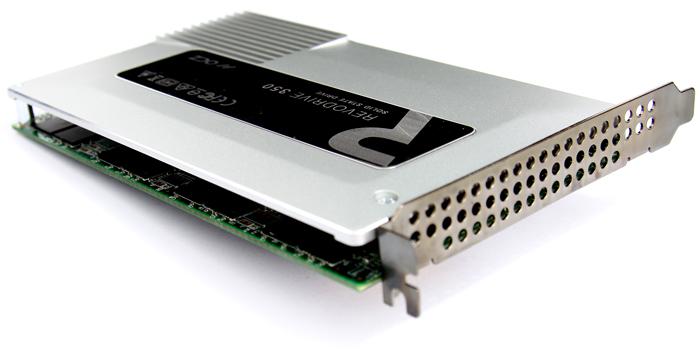Final Words & Conclusion
Final Words & Conclusion
The RevoDrive series from OCZ have been a bit of mixed bag in terms of consumer reception and response. PCI Express based storage can be difficult in the sense that these products can react differently on the wide diversity of motherboards and processors. Also, in one hand it is a product that everybody likes then in the other we need to factor in the price. That thesis will not be any different with this generation of RevoDrive 350 PCIe SSDs. Fortunately NAND flash prices have plummeted ever since the last year or so, and OCZ now being a subsidiary of Toshiba certainly will help there as well. However the R&D, the usage of 2 to 4 LSI SandForce SSD controllers and a RAID chip to make all this sweet perf happen is the real conundrum that makes this product a bit expensive. The flip-side of the coin is that nobody in the consumer market can really do what OCZ does, this product is insane in terms of speed and if you purchase the 480 GB model, it won't double or triple your Storage IO performance, it will nearly quadruple it compared to your average SSD. Much like enthusiast class graphics cards the sky is the limit this storage solution simply shatters a lot of records.
Performance
The RevoDrive 350 (480 GB) performance is close to advertised, it can reach near 1,700 to 1,800 MB/sec reads and yeah it surely does reach 1,500+ MB/sec writes. This however always goes for selected benchmarks with bigger sequential writes. We have seen oddities on some benchmarks and raving pref on others. Once you pass 64 KB files sizes the performance jumps up hard and fast easily passing 1,250 MB/sec easily. So the PCI Express storage unit shines at large sequential writes. IOPs performance was very good as well, in pale comparison to the last gen RevoDrive 3 X2 less impressive. Unfortunately our trace test PCMark Vantage 64-bit was showing massive issues with the RevoDrive, we always have issues with that software and RAID solutions some how. It was such a weird anomaly that we deiced to simple leave out the results as it has to be isolated to our test system.
Overall SSD Usage
As stated we very much enjoy the grand overall performance of this SSD series, so when you copy a fast amount of compressed data, then the SSD will perform seriously fast in performance. Make no mistake, replacing a HDD with an SSD in your desktop PC or laptop eliminates the random access lag of the HDD head, it is no longer mechanical. That combined with the performance a PCie solution offers these days is simply a massive difference and probably the best upgrade you can make for your computer anno 2014 if you are pursuing enthusiast class performance.
Price, HDD VS SSD
This is my standard paragraph on how we feel about Nand Flash storage solutions. This paragraph is about SSDs in general, not specific to the OCZ RevoDrive. First a generic rule that I always apply; you should probably stop looking at the Solid State Disk technology as if it were a traditional HDD. We'll all be old and grey before the two reach the same prices or top the multiple TB volume storage the HDD offers for less money. Comparing an SSD with an HDD is making a comparison in-between an integrated IGP or a dedicated graphics card, that last one will cost you a heck of a lot more yet you gain incredible overall performance. It is the very same with an SSD, use it as boot drive on Windows and applications and you instantly have removed a huge bottleneck, namely load and access times. It is a difference in-between night and day (in a proper system). For massive storage like movies, MP3 files and bulky data you do not access on a regular basis, sure that's where the HDD remains the winner as a cheaper storage solution. Guru3D's rule of thumb; the magic simply is finding a good combination in-between the two and balance things out. Use a nice 240 GB SSD for your operating system and applications, and park these movies and MP3 files onto a separate TB HDD. That's where the magic happens. I kid you not, all my test systems and work systems run on SSDs, not once have I considered going back to HDDs. The benefits of a good SSD are simply grand. But that doesn't mean I do not understand the budget and cost dilemma that many of you are facing though.
Pricing
You may expect the following prices, MSRP:
- 240 GB - 529 USD 2.20 / GB
- 480 GB - 829 USD 1.72 / GB
- 960 GB - 1299 USD 1.35 / GB
These are rough MSRP prices. You'll receive a three year carry-in warranty with this drive. Albeit steep, keep in mind that in 2011 a 960 GB RevoDrive X2 did cost 3000 USD.
Concluding
We have some exciting times ahead of us alright, this year we'll see 10 Gbps interfaces like the M2 port take off, bringing performance close to say 700 - 800 MB/sec on a small SSD that you inject onto your motherboard. Those that do not have such an interface yet do want to enjoy sheer performance, well, that's where the more classic designs like PCI Express based add-in cards would work out really well. The RevoDrive 350 OCZ now has come full cycle and is offering a very stable and is an almost nauseating fast PCIe SSD. This is pure unadulterated performance thrown right at your face. The RevoDrive 350 offers storage madness if you are after pure storage performance. Few, very few can come close to what OCZ offers here. The innovation, product class, segment and component selection make this product very expensive though. Regardless of that, the originality and ongoing strive for better storage solutions is a long crusade that OCZ seems to win.
The RevoDrive 350 is easily on my personal shortlist of products to have in my PC, but we do understand the complication of its pricing level, which is hard to swallow in the consumer market. Regardless of that, the RevoDrive 350 will be easily one innovative and desirable products of 2014 as far as we are concerned. We have massive respect for this product alright. You just have to wonder though, who will be the first company to break the 2 GB/sec barrier in the consumer channel.
One last quick note to OCZ R&D -> next time a black PCB okay ? These board will end up in high-end/enthusiast class PCs, these all have a black PCB motherboard. A green PCB is so 2004 ;)
- Sign up to receive a notice when we publish a new article
- Or go back to Guru3D's front page


